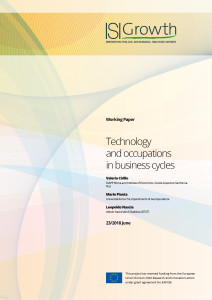Building on studies on the impact of the Great Recession on the occupational and skill structure of employment, this article investigates developments over the last business cycle (2002-2007 and 2007-2011) in 38 manufacturing and service industries of five major European countries (Germany, France, Spain, Italy and United Kingdom). We analyze how technology, education and wages have shaped the evolution of four professional groups – Managers, Clerks, Craft and Manual workers – defined on the basis of ISCO classes. During the upswing in manufacturing industries all professional groups except managers have experienced job losses, while new jobs in services have followed a pattern of growing occupational polarization. Demand growth has a general positive effect across all occupations; new products lead to job creation in the group of managers only; wage increases slow down job creation except in the lowest occupational group. During the downswing large job losses are concentrated in the lowest occupations and most relationships – including the role of demand and wages – break down; product innovation loses its positive impact on jobs while new processes drive restructuring and job destruction across all professional groups.
Technology and occupations in business cycles
Valeria Cirillo
INAPP Rome and Institute of Economics, Scuola Superiore Sant’Anna, Pisa
Università Roma Tre, Dipartimento di Giurisprudenza
Istituto Nazionale di Statistica (ISTAT)

